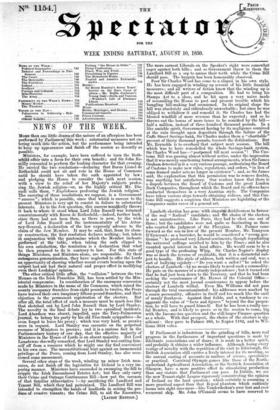Lambeth election hasgone with singultle decisiveness in favour of the
real ” Radical " candidate ; and the choice of the electors is not uninstructive. Like Paris, they had to -elect one out of three ; but the candidates were not quite so fascinating as those who courted the judgment of the Phrygian. Mr. Palmer came forward as the son-in-law of the present Member, Mr. Tennyson D'Eyncourt : as a barrister, he would be considered a "young gen- tleman " : he professed very Liberal sentiments, though repudiating the universal suffrage ascribed to him by the Times ; and he also vaunted special interest in local affairs. He would seem to be a good type of the professing Whig. Sir Charles Napier's display was so much the reverse of creditable, that it is a distasteful sub- ject to handle. His style of address, both written and oral, was a sort of bullying cajolery—" Do you want a sailor? "he asked the electors of Lambeth—by no means likely to need such a commodity. He puts on the manner of a sturdy independence ; but it turned out that he had just been down to the Treasury, and that he had been seeking the countenance of Mr. Hawes of the Colonial Office—. certainly not the most jocund countenance to appear before the electors of Lambeth withal. Even Mn Williams did not pass through the trial uncontaminated: his addresses were marked by a coarse personality, offensive in itself and too much like the cant of manly frankness. Against that foible, and a tendency to ex- aggerate the value of "facts and figures" beyond the due propor- tion, he will have to guard himself. But he has been a really use- ful Member, and is likely to prove so in the session to come, big with the Income-tax question and the still larger Finance question as a whole. With that prospect, the choice of the electors is sig- nificant : they gave to Palmer 586, to Napier 1182, and to Wil- liams 3834 votes.


























